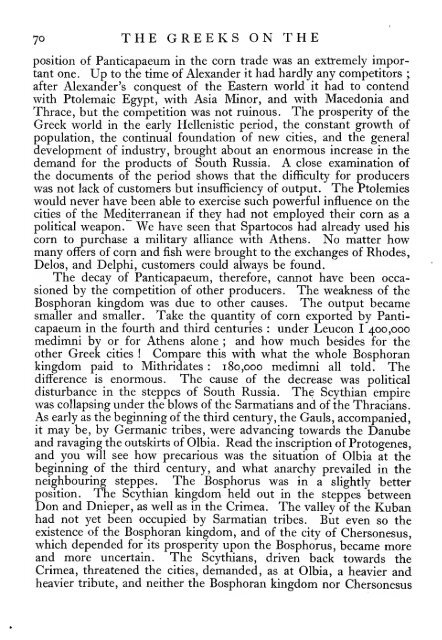Iranians and Greeks in South Russia - Robert Bedrosian's Armenian ...
Iranians and Greeks in South Russia - Robert Bedrosian's Armenian ...
Iranians and Greeks in South Russia - Robert Bedrosian's Armenian ...
Create successful ePaper yourself
Turn your PDF publications into a flip-book with our unique Google optimized e-Paper software.
70<br />
THEGREEKSONTHE<br />
position of Panticapaeum <strong>in</strong> the corn trade was an extremely impor-<br />
tant one. Up to the time of Alex<strong>and</strong>er it had hardly any competitors i<br />
after Alex<strong>and</strong>er's conquest of the Eastern world it had to contend<br />
with Ptolemaic Egypt, with Asia M<strong>in</strong>or, <strong>and</strong> with Macedonia <strong>and</strong><br />
Thrace, but the competition was not ru<strong>in</strong>ous. The prosperity of the<br />
Greek world <strong>in</strong> the early Hellenistic period, the constant growth of<br />
population, the cont<strong>in</strong>ual foundation of new cities, <strong>and</strong> the general<br />
development of <strong>in</strong>dustry, brought about an enormous <strong>in</strong>crease <strong>in</strong> the<br />
dem<strong>and</strong> for the products of <strong>South</strong> <strong>Russia</strong>. A close exam<strong>in</strong>ation of<br />
the documents of the period shows that the difficulty for producers<br />
was not lack of customers but <strong>in</strong>sufficiency of output. The Ptolemies<br />
would never have been able to exercise such powerful <strong>in</strong>fluence on the<br />
cities of the Medrterranean if they had not employed their corn as a<br />
political weapon. We have seen that Spartocos had already used his<br />
corn to purchase a military alliance with Athens. No matter how<br />
many offers of corn <strong>and</strong> fish were brought to the exchanges of Rhodes,<br />
Delos, <strong>and</strong> Delphi, customers could always be found.<br />
The decay of Panticapaeum, therefore, cannot have been occasioned<br />
by the competition of other producers. The weakness of the<br />
Bosphoran k<strong>in</strong>gdom was due to other causes. The output became<br />
smaller <strong>and</strong> smaller. Take the quantity of corn exported by Panticapaeum<br />
<strong>in</strong> the fourth <strong>and</strong> third centuries : under Leucon I 400,000<br />
medimni by or for Athens alone ; <strong>and</strong> how much besides for the<br />
other Greek cities ! Compare this with what the whole Bosphoran<br />
k<strong>in</strong>gdom paid to Mithridates : 180,000 medimni all told. The<br />
difference is enormous. The cause of the decrease was political<br />
disturbance <strong>in</strong> the steppes of <strong>South</strong> <strong>Russia</strong>. The Scythian empire<br />
was collaps<strong>in</strong>g under the blows of the Sarmatians <strong>and</strong> of the Thracians.<br />
As early as the beg<strong>in</strong>n<strong>in</strong>g of the third century, the Gauls, accompanied,<br />
it may be, by Germanic tribes, were advanc<strong>in</strong>g towards the Danube<br />
<strong>and</strong> ravag<strong>in</strong>g the outskirts of Olbia. Read the <strong>in</strong>scription of Protogenes,<br />
<strong>and</strong> you will see how precarious was the situation of Olbia at the<br />
beg<strong>in</strong>n<strong>in</strong>g of the third century, <strong>and</strong> what anarchy prevailed <strong>in</strong> the<br />
neighbour<strong>in</strong>g steppes. The Bosphorus was <strong>in</strong> a sHghtly better<br />
position. The Scythian k<strong>in</strong>gdom held out <strong>in</strong> the steppes between<br />
Don <strong>and</strong> Dnieper, as well as <strong>in</strong> the Crimea. The valley of the Kuban<br />
had not yet been occupied by Sarmatian tribes. But even so the<br />
existence of the Bosphoran k<strong>in</strong>gdom, <strong>and</strong> of the city of Chersonesus,<br />
which depended for its prosperity upon the Bosphorus, became more<br />
<strong>and</strong> more uncerta<strong>in</strong>. The Scythians, driven back towards the<br />
Crimea, threatened the cities, dem<strong>and</strong>ed, as at Olbia, a heavier <strong>and</strong><br />
heavier tribute, <strong>and</strong> neither the Bosphoran k<strong>in</strong>gdom nor Chersonesus

















